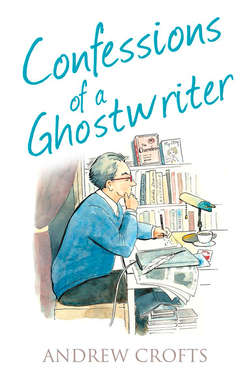Читать книгу Confessions of a Ghostwriter - Andrew Crofts - Страница 24
Filthy lucre
ОглавлениеIt’s vulgar to talk about money, I know, but it’s so interesting to know how other people manage and to draw comparisons, which is invidious, but we’ve all got to earn the stuff somehow and if no one talks about it how do we ever learn what’s going on?
The first criterion for considering any project is always whether I find it interesting enough to spend several months of my life thinking and writing about it. But there always has to be a second criterion too – can the project be made to pay in some way?
The moment you decide that you are going to earn your living as a freelance writer (or a freelance anything for that matter), you condemn yourself to a lifetime of thinking about money. Every day you will find yourself frantically doing sums in your head when you should be thinking about something more productive, trying to reconcile the money that you think you are going to be earning in the next month or two with the bills that you know for sure are going to be coming in.
You have only a limited number of hours in every day and so you cannot waste too many of them on speculative projects that don’t work out. But at the same time you know that it is often the speculative projects, the biggest gambles, that produce the most dramatic results. But which ones? There is no way of knowing. Can you afford to do ten speculative books in the hope that one of them will prove to be a bestseller and compensate if the other nine fail to earn a bean? These are the questions that will be haunting you as you try to get to sleep at night, and will still be there when you wake up in the morning, and linger around in the background for most of the hours in between.
As you get older and take on family responsibilities the calculations grow more urgent and more hours of work have to be found at just the moment when other demands on your time are increasing. Sometimes you must choose projects with good commercial potential over those with more literary appeal. Sometimes you must tilt the telling of a story in ways that might not be to your personal taste in order to appeal to as wide a market as possible. You can blame the commercial demands of the publisher for such lapses if you like, but the truth is you stand to gain as much from increased sales and happier readers as they do.
Some writers escape from the financial treadmill when they hit upon an unexpected seam of gold (Harry Potter, Fifty Shades, etc.), others supplement their writing with earnings from broadcasting, journalism or university teaching. Yet more treat writing as a sideline, being primarily professors, chefs, actors or television presenters. If you do none of these things, concentrating on the writing of books as your sole source of income, you are going to have to grow ruthless in your self-discipline both in the projects that you agree to take on and in the hours that you work. It is a fabulous way to earn a living, but keeping the money coming in is grindingly and relentlessly distracting.
One of the sums that I used to use to try to cheer myself up on bad days was to extrapolate out possible future earnings by assuming they would continue to rise at the same level as in the past. Quite early on I had a particularly good year in which I managed to make twice as much as the year before. To avoid writing whatever it was I was meant to be writing, I immediately wasted my time drawing up a chart showing how much I would be earning in the future if I continued along the same line, doubling my income every year. By doing that you can go from £20,000 a year to over £20 million a year in just ten years.
I managed to remain quite excited by this prospect for some time, despite my wife’s scepticism as to whether I had any grasp at all on the economic realities of life. The following year, however, I was back down at a figure somewhere between the previous two years and new graphs had to be thought up in order to remain optimistic.
The sums that publishers sometimes bandy around as advances can also be deceptive. If a publisher offers a quarter of a million pound advance it sounds like a lottery win, and feels like one for as long as it takes before you actually go away and do the sums. If the project is ghostwritten then that figure is going to be divided between two people and probably an agent will be taking 15 per cent as well. It will then be pointed out that the publisher wants two books for that money, so the money halves again and will be paid out in bits and pieces over the next two years, which comes out at £50,000 a year each for two years before tax. It’s certainly a nice wage, but no longer looks quite so much like a lottery win. If the book then takes off there may well be royalties down the line, but more often than not the advance is the end of the story.
